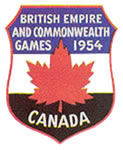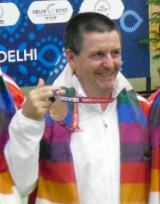
The Commonwealth Games is a quadrennial international multi-sport event among athletes from the Commonwealth of Nations, which mostly consists of territories of the former British Empire. The event was first held in 1930 and, with the exception of 1942 and 1946, has successively run every four years since. The event was called the British Empire Games from 1930 to 1950, the British Empire and Commonwealth Games from 1954 to 1966, and British Commonwealth Games from 1970 to 1974. Athletes with a disability are included as full members of their national teams since 2002, making the Commonwealth Games the first fully inclusive international multi-sport event. In 2018, the Games became the first global multi-sport event to feature an equal number of men's and women's medal events, and four years later they became the first global multi-sport event to have more events for women than men.

The 1954 British Empire and Commonwealth Games was held in Vancouver, British Columbia, from 30 July to 7 August 1954. This was the first event since the name change from British Empire Games took effect in 1952.
Derek James Neville Johnson was a British track and field athlete.
Jonathan Peter Ridgeon is an English former athlete who competed mainly in the 110 metres hurdles and the 400 metres hurdles. In the 110m hurdles, he won the silver medal at the 1987 World Championships and the gold medal at the 1987 Universiade. He represented Great Britain at the 1988 Seoul Olympics and the 1996 Atlanta Olympics.
Jean Catherine Pickering was a female track and field athlete from Great Britain, who competed mainly in the 80 metres hurdles and long jump.
Andrew John Holmes MBE was a British rower.

The Commonwealth Paraplegic Games were an international, multi-sport event involving athletes with a disability from the Commonwealth countries. The event was sometimes referred to as the Paraplegic Empire Games and British Commonwealth Paraplegic Games. Athletes were generally those with spinal injuries or polio. The Games were an important milestone in the Paralympic sports movement as they began the decline of the Stoke Mandeville Games' dominating influence. The event was first held in 1962 and disestablished in 1974. The Games were held in the country hosting the Commonwealth Games for able-bodied athletes, a tradition eventually fully adopted by the larger Olympic and Paralympic movements.

Michael Gault OBE, is an English sport shooter. He has competed at the Commonwealth Games on six occasions winning eighteen medals, a record for athletes in any sport that he jointly holds with Australian shooter Phillip Adams, but has never been selected for the British Olympic team. Gault also won two ISSF World Cup bronze medals whilst representing Great Britain.

Peter Wells was a British-born athlete who competed in the High Jump at the 1952 and 1956 Summer Olympics.
Alan Richard Watson was a British rower. He competed in the men's eight event at the 1956 Summer Olympics.
Frederick Green (1926-2006), was a male athlete who competed for England and 3 miles world record holder.
Alastair R Davidson is a male former rower who competed for England.
Joseph Noor Eldeen (1923-2000), was a male former rower who competed for England.
John Pope is a male former rower who competed for England.
David R Glynne-Jones, is a Welsh born male former rower, who competed for England.
Maurice Legg is a male former rower who competed for England and Great Britain. He had six children. In order of age they are: Suzanne, Stephanie, Michael, David, Peter and John Paul.
Alan Walter Hime, was a male swimmer who competed for England.
Dennis R Mount (1929-2016), was a male rower who competed for England.
Anthony 'Tony' Chapman Hancox, was a male rower who competed for England.
Donald 'Don' S S Elliot, is a male former rower who competed for England.



